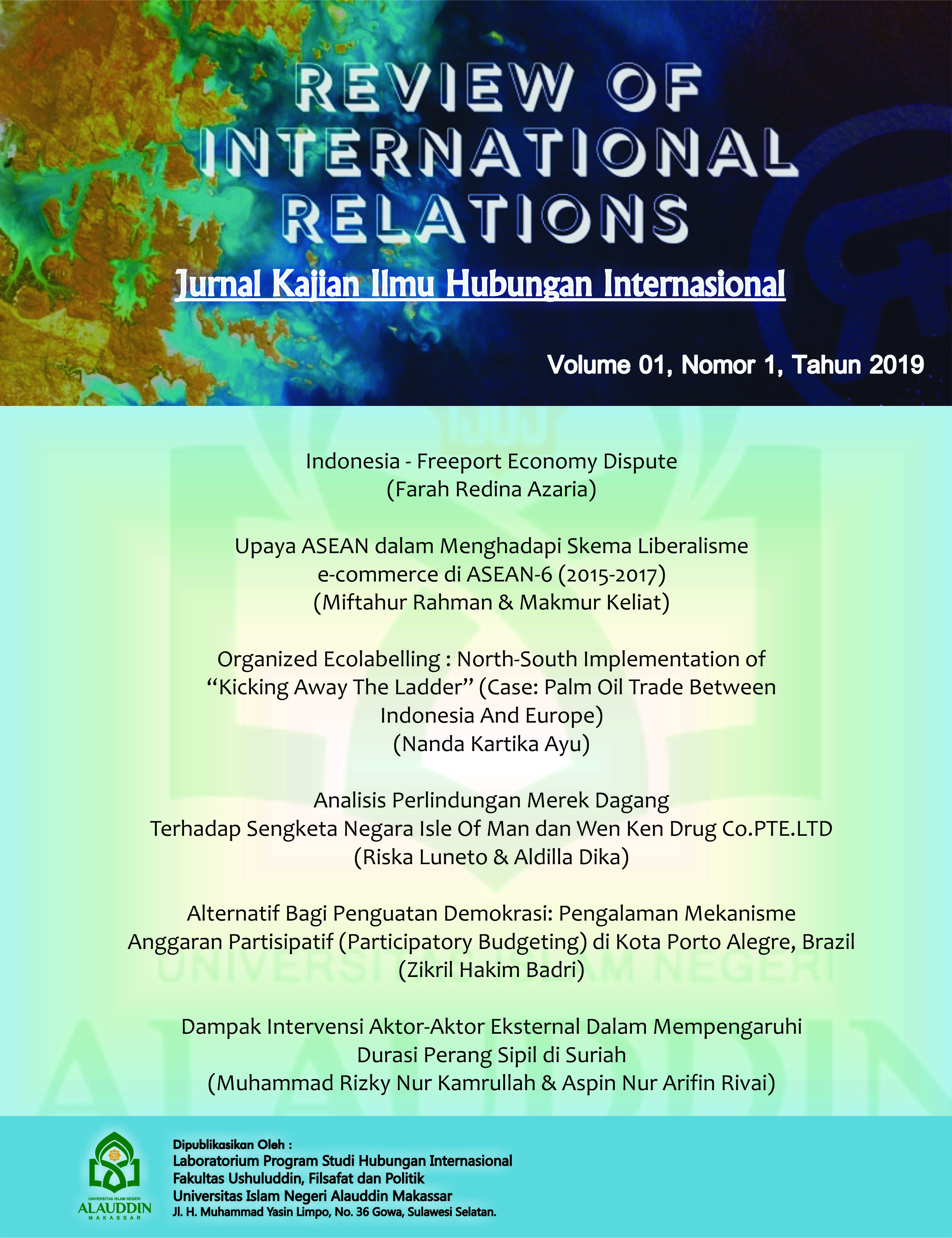ORGANIZED ECOLABELLING: NORTH-SOUTH IMPLEMENTATION OF “KICKING AWAY THE LADDER” (CASE: PALM OIL TRADE BETWEEN INDONESIA AND EUROPE)
Abstract
Liberalization is one of the theis that is expected to be able to answer the acceleration and development of the economy of developing countries. One element of liberalization is market openness that will make developing countries unite with global markets both in accepting investments or trading in exports and imports. However, along with the development of technology, the demand for the North (developed countries) in carrying out its trade began to implement an "ecolabelling" policy. For developing countries with all their industrial capabilities, ecolabelling policy is the same as the non-tarrif limitation policy given by developed countries to developing countries. So that this paper will focus on the application of the ecolabelling policy provided by the North to products that will enter the northern market, as one of the efforts of the northern countries to apply "kicking away the ladder", assuming the Southern state does not get a balanced trade surplus with the north and continues to be a developing country. This writing will use a structuralist approach that concentrates on the international structure of the north and south to describe the relationship between developed and developing countries, and uses the concept of "kicking away the ladder" to answer the situation from the implementation of ecolabelling policies for South countries. The author uses qualitative studies using literature review sources through books, journals and online media.
Keywords: Ecolabelling, Kicking away the ladder. North-South relations
Downloads
References
Abe K., H. a. (2002). Eco-Labelling, Ennvironment, and International Trade .
Actualitix. (2016, Januari 10). Sunflower Oil - Production (Tons). Retrieved Juni 18, 2018, from Actuatix: http://en.actualitix.com/country/fra/france-sunflower-oil-production.php
Andrew Jordan, R. K. (2003). Comparative Conclusions - 'New' Environmental Policy Instrument : An Evolution or a Revolution in Environmental Policy? Environmental Politics, Volume 12, Nomor 1, 201-224, DOI: 10.1080/714 000667.
Arias, M. a. (2015, October). Trapped : Few Developing Countries Can Climb The Economic Ladder or Stay There. Retrieved June 18, 2018, from Federal Reserve Bank of St. Louis: https://www.stlouisfed.org/publications/regional-economist/october- 2015/trapped-few-developing-countries-can-climb-the-economic-ladder-or-stay-there
Chang, H. J. (2002). Kicking Away The Ladder : An Unofficial History of Capitalism, Especially in Britain and United States. Taylor& France, Volume 45, Nomor 5, 63-97.
Chang, J. (2002). Kicking Away The LAdder : An Unofficial History of Capitalism. Especially in Britain and Challenge, Vol. 45, Nomor 5, 63-97.
Davies, N. (2000). The Isles : A History. London: MacMillan.
Denis Drexler, J. F. (2018). The Effect of Organic Food Labels on Consume Attention . Journal of Food Products Marketing, Volume 24, Nomor 4, 441-455, DOI: 10.1080/10454446.2017.1311815.
E.S.Nesadurai, H. (2013). Food Security, The Palm Oil-Land Conflict Nexus and Suistanability : A Governance Role for a Private Multi-Stakeholder Regime Like The RSPO? The Pacific Review, Volume 26, Nomor 5, 505-529, DOI: 10.1080/09512748.2013.842311.
Francesca Pepe, S. P. (2018). Suistanability Standard Setting as Local Government Matter : an Italian Experience . Public Management Review, Volume 20, Nomor 1, 176-200, DOI: 10.1080/14719037.2017.1293144.
Gilles Grolleau, L. I. (2015). Helping Eco-Labels to Funfil Their Promises. Climate Change, DOI: 10.1080/14693062.2015.1033675.
Gumelar, G. (2017, April 18). RSPO Nilai Boikot Uni Eropa Momentum Perbaikan Industri Sawit . Retrieved June 19, 2018, from CNN Indonesia : https://www.cnnindonesia.com/ekonomi/20170418152558-85-208411/rspo-nilai-boikot- uni-eropa-momentum-perbaikan-industri-sawit
Harrison, K. (1999). Racing to The Top or The Bottom ? Industry Resistance to Eco-Labelling of Paper Products in Three Jurisdictions . Environmental Politics, Volume 8, Nomor 4, 110-136, DOI: 10.1080/09644019908414496.
K.W. Wurzel, L. B. (2003). Struggling to Leave Behind a Highly Regulatory Past ?'New' Environmental Policy Instruments in Austria. Environmental Politics, Volume 12, Nomor 1, 51-72, DOI: 10.1080.
Magnus Bostrom, M. G. (2015). How to Achieve Suistanable Procurement for "peripheral" Products with Significant Environmental Impacts. Suistanability : Science, Practice, and Policy, Volume 11, Nomor 1, 21-31, DOI: 10.1080/15487733.2015.11908136.
Nauman, E. (n.d.). Eco-Labelling : Overview and Implications for Developing Countries . Development Policy Research Unit University of Cape Town.
Neale, A. (1997). Organising Environmental Self-Regulation : Liberal Governmentality and The Pursuit of Ecological Modernisation in Europe. Environmental Politics, Volume 6, Nomor 4, 1-24, DOI: 10.1080/09644019708414356.
Nesadurai, H. (2003). Food Security, The Palm Oil-Land Nexus and Suistanability : A Governance Role for a Private Multi-Stakeholder Regime Like The RSPO? The Pasific Review , 505-529.
Network, G. E. (2004, July). Global Ecolabelling Network. Retrieved October 15, 2018, from GEN: https://globalecolabelling.net/assets/Uploads/intro-to- ecolabelling.pdf
Network, G. E. (n.d.). Getting Environmental Certification. Retrieved June 2018, from Global Ecolabelling Network : https://globalecolabelling.net/about/getting- environmental-certification/
Nurdin, I. (2015). Menata Ulang Kelembagaan Agraria Nasional pada Pemerintahan Jokowi-JK. Insignia Journal of International Relations, Volume 2, Nomor 1, 42-53, DOI:10.20884/1.ins.2015.2.01.445.
Persaud, B. (2003). Environment and The WTO . The Commonwealth Kournal of International Affairs, Volume 92, 623-635.
Polak, J. (n.d.). Trade as an Environmental Policy Tool ? GEN, Ecolabelling and Trade. WTO Public Symposium Challanges Ahead on The Road to Cancun.
Polak, J. (n.d.). Trade as an Environmental Policy Tool? GEN, Ecolabelling and Trade-Ecolabelling : Trade Opportunities & Challanges. World Trade Organization Public Symposium Challanges Ahead on The Road to Cancun.
R.S., A. (2018, Januari 22). Voting CPO di UE : Parlemen Eropa Beberkan Alasan Sikap . Retrieved Juni 19, 2018, from Industri Bisnis: http://industri.bisnis.com/read/20180122/12/729363/voting-cpo-di-ue-palemen-eropa- beberkan-alasan-sikapnya
Rostanti, Q. (2015, December 9). Inggris Produktif Ciptakan Teknologi Ramah Lingkungan. Retrieved June 18, 2018, from Republika: http://www.republika.co.id/berita/nasional/umum/15/12/09/nz2n4n280-inggris-produktif- ciptakan-teknologi-ramah-lingkungan
Stern, R. (2012). Addresses The Central Negotiating Issues Involving The Trade Policies and Relations between The United States and Japan. Michigan: University of Michigan Press.
Sucipto. (2011, April 13). Pentingnya ISPO bagi Standar Sawit Nasional. Retrieved June 8, 2018, from Beritasatu: tu: http://id.beritasatu.com/home/pentingnya-ispo-bagi-standar-sawit- nasional/9572
Uche, L. (2011). Some Reflections on The Dependency Theory. African Media Review, Volume 6.
Uche, L. U. (1994). Some Reflection on The Dependency Theory. Africa Media Review, Volume 8, Nomor 2.
Utami, A. T. (2015). Upaya Diplomasi Indonesia dalam Forum G20 untuk Mewujudkan Framework for Strong, Suistanable, adn Balanced Growth 2008-2012. Insignia Journalof International Relations, Volume 2, Nomor 2, DOI:10.20884/1.ins.2015.2.02.455.
Yani, I. (2016, February 19). Sertifikat Sawit ISPO dan RSPO. Ini Bedanya. Retrieved June 19, 2018, from Riau Online : http://www.riauonline.co.id/bisnis/read/2016/02/19/sertifikasi- sawit-ispo-dan-rspo-ini-bedanya










